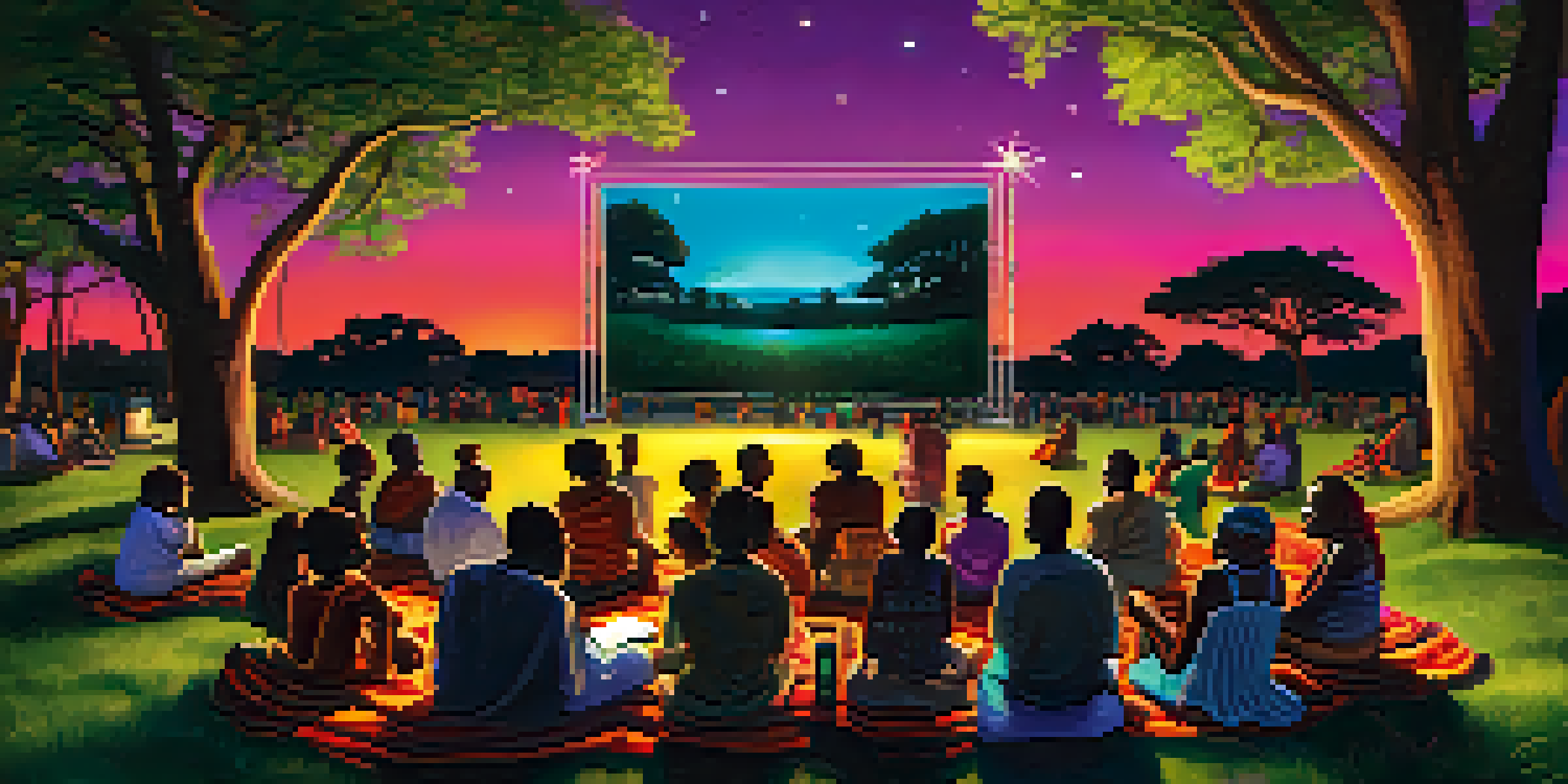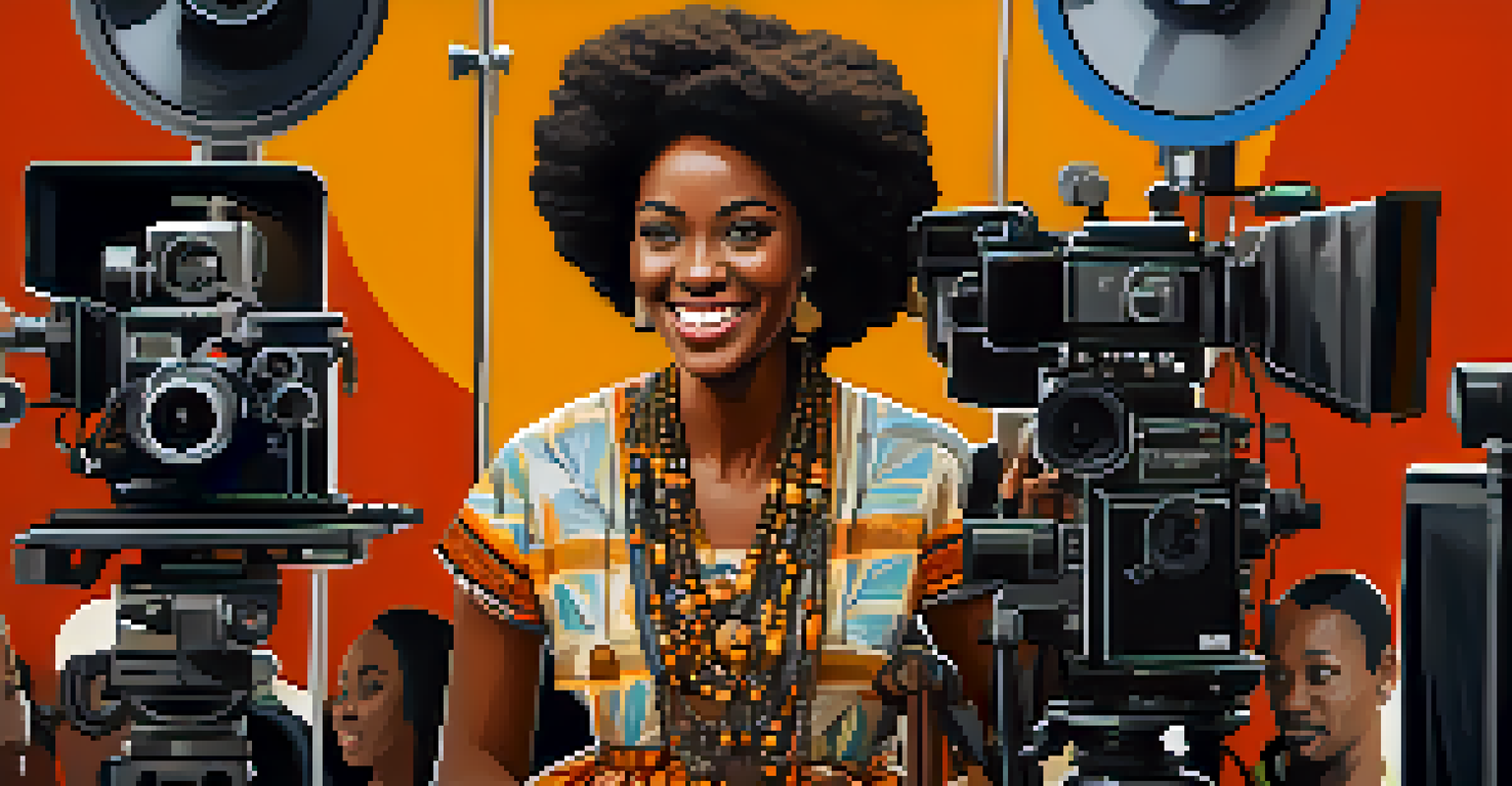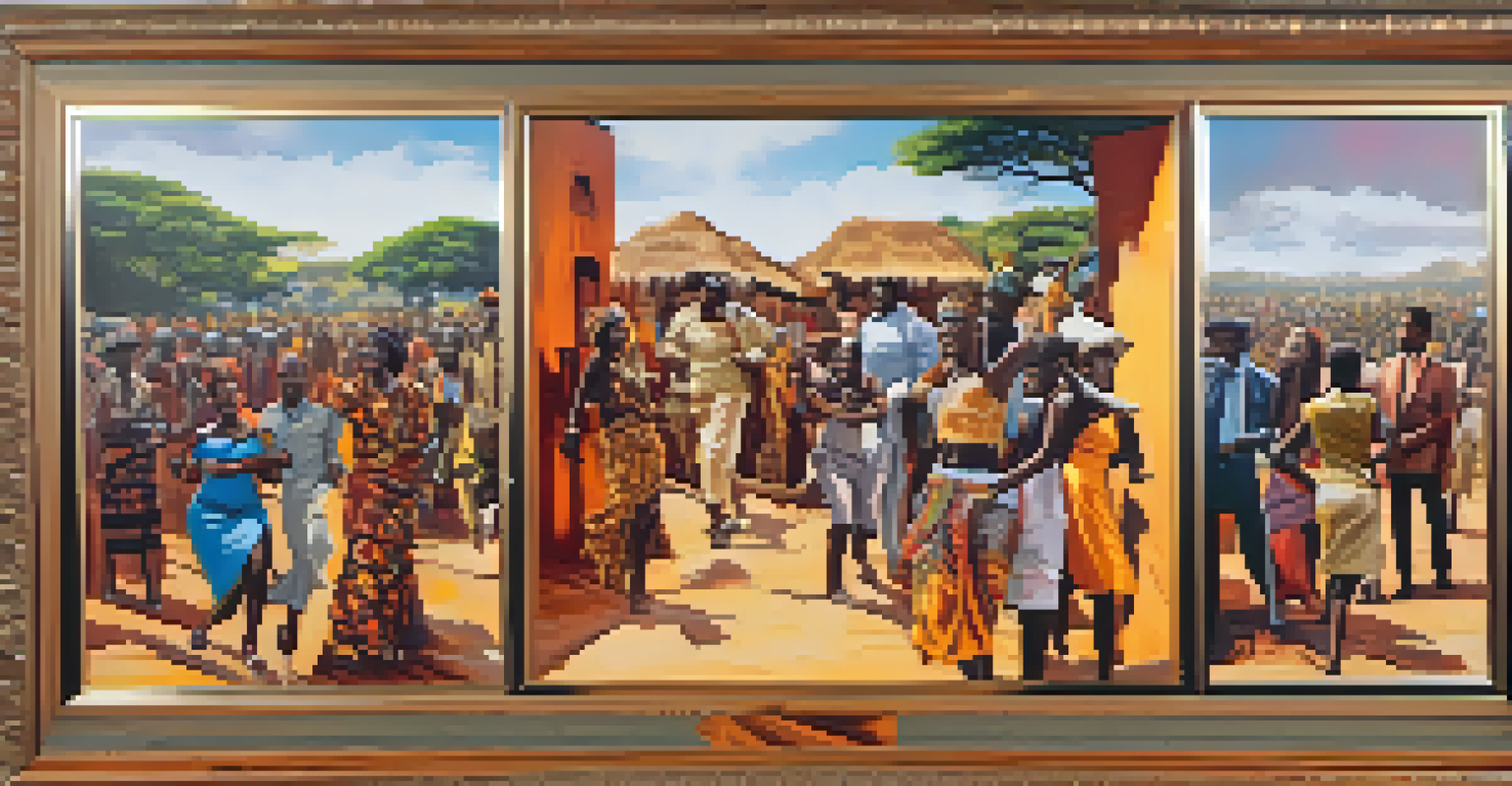African Cinema: Diverse Narratives Shaping Global Perspectives

The Rich Tapestry of African Cinema
African cinema is a vivid tapestry woven from countless cultures, languages, and traditions. It reflects the continent's diverse narratives, each telling a unique story that resonates with local and global audiences. From Nollywood's prolific output in Nigeria to the art-house films of South Africa, the variety is staggering. These films not only entertain but also serve as a mirror, reflecting societal issues and aspirations.
Cinema is a matter of what's in the frame and what's out of it.
Many filmmakers use their craft to address pressing topics like colonialism, identity, and resilience. For instance, films like 'Timbuktu' and 'The Last Face' challenge viewers to confront the realities of war and displacement. This rich storytelling tradition enriches the global cinematic landscape, allowing viewers to experience perspectives they might not encounter otherwise.
As African cinema continues to evolve, it increasingly garners international attention, winning awards and accolades at prestigious film festivals. This growing recognition not only elevates individual filmmakers but also showcases the continent's potential to influence global narratives. The result is a dynamic interplay of cultures that broadens our understanding of the world.
Cultural Representation and Authenticity
Cultural representation in film plays a crucial role in shaping perceptions and narratives. African filmmakers often prioritize authenticity, striving to portray their cultures accurately and respectfully. This commitment to representation helps combat stereotypes that have historically plagued African portrayals in global cinema.

For example, films like 'Queen of Katwe' and 'Fences' highlight the richness of African experiences, showcasing the complexity of its people beyond poverty or conflict. By focusing on diverse stories, these films foster empathy and understanding, allowing audiences to connect with the characters on a personal level. This shift in representation is vital for creating a more balanced narrative landscape.
Diverse Narratives Enrich Cinema
African cinema presents a rich variety of stories that reflect the continent's unique cultures and societal issues.
Moreover, the rise of streaming platforms has made African films more accessible than ever. Viewers around the world can now enjoy stories that were once confined to local theaters. This accessibility not only boosts the visibility of African cinema but also encourages dialogue about cultural diversity and inclusivity in the film industry.
The Impact of Technology on African Filmmaking
The advent of technology has revolutionized filmmaking across the globe, and Africa is no exception. With the rise of affordable cameras and editing software, aspiring filmmakers can now tell their stories without the constraints of a large budget. This democratization of film production has led to a surge of innovative content from various regions of the continent.
Film is a universal language that can transcend cultural barriers and bring people together.
Social media platforms and online streaming services have further amplified the reach of African cinema. Filmmakers can share their work directly with audiences, bypassing traditional distribution hurdles. This shift enables independent creators to gain recognition and forge connections with fans, fostering a vibrant online community dedicated to African storytelling.
As technology continues to advance, the potential for collaboration among filmmakers from different countries grows. Cross-border partnerships can lead to unique storytelling opportunities, blending diverse perspectives and styles. This collaborative spirit promises to enrich African cinema, ultimately shaping its future on the global stage.
Women in African Cinema: Voices Rising
Women have historically faced significant barriers in the film industry, but African cinema is seeing a remarkable shift. Female filmmakers are emerging as powerful voices, challenging the status quo and telling stories that resonate deeply with audiences. Their unique perspectives bring fresh narratives to the forefront, highlighting issues such as gender equality and cultural heritage.
Films like 'Rafiki' and 'The Last Tree' showcase the talent of women directors and writers, proving that diverse voices can create impactful cinema. These stories often center on the complexities of womanhood, identity, and love, offering audiences a glimpse into the multifaceted lives of African women. By elevating these narratives, female filmmakers are reshaping the cinematic landscape.
Women Elevate African Filmmaking
Female filmmakers are gaining prominence, bringing fresh perspectives and important narratives to African cinema.
Moreover, the growing support for women in the industry is encouraging younger generations to pursue careers in film. Initiatives aimed at empowering aspiring female filmmakers are on the rise, providing mentorship and resources. This movement not only enriches African cinema but also inspires future storytellers to explore their own narratives.
The Role of Festivals in Promoting African Cinema
Film festivals play a pivotal role in promoting African cinema, providing a platform for filmmakers to showcase their work. Events like the Durban International Film Festival and the African Movie Academy Awards celebrate the talent and creativity emerging from the continent. These festivals not only highlight local films but also foster connections between filmmakers and audiences.
By offering networking opportunities, festivals can help filmmakers secure funding and distribution deals, crucial for the sustainability of their projects. They also encourage collaboration among creators, sparking innovative ideas and partnerships. This collaborative environment strengthens the film community and enhances the quality of storytelling.
Furthermore, festivals often include workshops and panel discussions, allowing filmmakers to share knowledge and experiences. This exchange of ideas is invaluable for the growth of the industry, as it cultivates a supportive network of professionals committed to advancing African cinema. The impact of these festivals extends beyond entertainment, contributing to the cultural dialogue surrounding the continent.
Challenges Facing African Filmmakers
Despite the progress African cinema has made, filmmakers still face numerous challenges. Limited funding and resources can hinder the production of high-quality films, forcing many to operate on tight budgets. This financial strain can impact the creative process, restricting filmmakers' ability to fully realize their vision.
In addition, distribution remains a significant hurdle for many African films. With traditional cinema infrastructure lacking in some regions, filmmakers often struggle to reach wider audiences. The reliance on digital platforms has alleviated some of these issues, but there is still a long way to go in making African films widely accessible.
Technology Expands Film Opportunities
Advancements in technology are democratizing filmmaking in Africa, allowing more creators to share their stories with global audiences.
Moreover, filmmakers may encounter censorship or political barriers when tackling sensitive topics. Navigating these challenges requires resilience and creativity, as many filmmakers continue to push boundaries and tell their stories. By addressing these obstacles, the industry can move toward a more vibrant and sustainable future.
The Future of African Cinema: A Global Influence
As African cinema continues to evolve, its influence on the global stage is undeniable. With the increasing integration of African stories into international narratives, filmmakers are helping to reshape perceptions and challenge stereotypes. This cultural exchange enriches the global film landscape, fostering a more inclusive dialogue.
Emerging talents are also exploring new genres and formats, expanding the possibilities of storytelling. From documentaries to animated films, the diversity of African cinema is boundless. This creativity not only captivates audiences but also invites them to engage with important social issues.

Looking ahead, the future of African cinema holds great promise. As more filmmakers gain recognition and support, their stories will continue to resonate across borders. This vibrant and dynamic art form will undoubtedly play a crucial role in shaping global perspectives for generations to come.